What are the latest updates to publications on first aid at work?
HSE has made recent updates to 2 publications on first aid at work:
This document provides guidance on:
- managing the provision of first aid (first-aid kit, equipment, rooms etc)
- requirements and training for first-aiders
- requirements for appointed persons
- making employees aware of first-aid arrangements
- first aid and the self-employed
- cases where first-aid regulations do not apply
The third edition was reissued with minor amendments in 2018 to:
- further clarify the significance of the 2013 amendment to regulation 3(2), which ended HSE’s approval of first-aid training providers
- update guidance on the use of automated external defibrillators, and blended learning in first-aid training
- incorporate some additional amendments to take account of other previous legislative changes
The third edition has been further updated with minor amendments in 2024 to:
- emphasise employers’ responsibilities to take account of employees’ mental health in their first-aid needs assessment
- change the term ‘catastrophic bleeding’ to ‘life-threatening bleeding’ with more guidance on what employers should do if they identify this as a risk in their workplace
- simplify guidance on how to decide what first aid to provide
How to go about selecting a first-aid training provider: A guide for employers
GEIS3 – Selecting a first aid training provider – A guide for employers (hse.gov.uk)
This guidance helps you identify and select a competent provider to deliver first aid training. The updates include simplified guidance on what employers should consider when selecting a training provider.
When your first-aid needs assessment indicates that trained first-aiders are required, the training should meet the required standard. First-aid training is available from a number of sources.
The 2013 amendment to regulation 3(2) of the Health and Safety (First-aid) Regulations 1981 removed the requirement for HSE to approve the training and qualifications of appointed first-aid personnel.
As HSE no longer approves first-aid training and qualifications, this guidance has been produced to help employers select first-aid training providers.
This document was updated in 2024 to simplify what employers should consider when selecting a training
The duty to manage asbestos in buildings
What is this asbestos guidance for?
This guidance is for the person who has a legal duty to manage asbestos in a building – the ‘duty holder’. This could be the:
building owner- landlord for the premises
- person or organisation with clear responsibility for the building’s maintenance or repair
The duty holder must protect people from the risks of exposure to asbestos. This includes people who:
- work in their buildings
- use them in other ways
You should assess your own competence. To do this, you may need to get some suitable training for duty to manage or additional support from industry specialists.
We have a video on the duty to manage asbestos. It takes you through the steps you must take to comply with the law and protect people.
What is the duty to manage asbestos in buildings?
The duty to manage asbestos in buildings covers:
- all non-domestic premises, like factories or shops
- ‘common parts’ of multi-occupancy domestic premises, like purpose-built flats
The duty to manage asbestos is part of the Control of Asbestos Regulations. It requires the person who has the duty (the ‘dutyholder’) to:
- assess if there are asbestos-containing materials (ACMs) present, the amount, where they are and their condition
- presume materials contain asbestos unless there is strong evidence that they do not
- make, and keep up to date, a record or register of the location and condition of the ACMs or presumed ACMs
- assess the risk of anyone being exposed to airborne fibres from the ACMs
- write an asbestos management plan to manage the risk, put the plan into action, monitor it and review it every 12 months or sooner if necessary
- monitor the condition of any ACMs or suspected ACMs
- provide information on the location and condition of the ACMs to anyone who may work on or disturb them, including the emergency services
The Approved Code of Practice: Managing and working with asbestos has more information to help you comply with the duty to manage asbestos.
You can use these webpages to check that you are taking the right steps and there are also examples of how asbestos risks can be managed.
Training for duty to manage
To make sure that ACMs within your premises are properly managed, you must identify the person within your organisation who will be responsible for that management.
The responsible or appointed person should be competent to do this work. This means they should have the resources, skills, training and authority to ensure the ACMs are managed effectively.
The right person for this role will vary:
- for small companies, it is likely to be the owner
- for larger organisations, where the role will be more involved, the safety, health and environment manager may be the appropriate person
- for others it may be the maintenance or estates manager, or the building or facility manager
As a dutyholder, you must provide additional training for those in control of parts of the asbestos management plan.
You should also be aware of your responsibilities under the duty to manage asbestos – attending appropriate training will help you.
There is advice on finding a training organisation in our guidance on asbestos information, instruction and training.
Introduction to asbestos safety
Our introduction to asbestos safety provides basic guidance to help protect yourself and others from the risks due to asbestos exposure.
It points employers, workers and others to the right guidance to comply with the law, depending on their job role and includes:
- why asbestos is dangerous and where it can be found
- carrying out an asbestos risk assessment
- relevant legislation
Video on the duty to manage asbestos
The following video sets out the basic steps you should take to manage any asbestos in your building and protect people from the risks of exposure.
Major pizza maker fined £800,000 after two workers caught up in machinery
This HSE report details what went wrong the outcomes…
One of the nation’s largest producers of supermarket pizzas has been fined £800,000 after two workers suffered serious injuries at its factory in Bolton.
Stateside Foods Limited produces millions of pizzas each year, supplied to major UK supermarkets. The company was hit with the fine after the employees were caught up in machinery at the Westhoughton site in two separate incidents during 2020.
Bolton Crown Court heard how one man had his arm drawn into an inadequately guarded conveyor belt at the Lancaster Way factory, on 8 January 2020. The injury to his arm resulted in the removal of muscle and required a skin graft. He has not returned to work since the injury and has been diagnosed with hypersensitivity in the affected arm.

Following on from this, on a night shift just nine months later, father of two Andrew Holloway had part of his middle figure severed after his hand was drawn between a roller and a conveyor belt on 14 October 2020. The acting team leader had been told of an issue on the production line and gone to investigate when the horrific incident happened.
“My right hand was drawn into the roller on the machine and when I pulled my hand out my fingers were hanging off,” he said.
“I was taken to hospital and was in and out of consciousness due to the shock and pain I was suffering.
“The pain was unbearable after the initial shock wore off; I have never experienced pain this bad in my life before.
“After I woke from the first operation, the surgeon informed me that he could not save my middle finger and had to remove the top section. They managed to save my ring finger by inserting a wire into it.”
Mr Holloway required a second operation to remove more of his middle finger as the tissue had not healed properly.
“I was unable to care for my three-year-old son after the accident as I couldn’t even get myself dressed let alone a three-year-old,” he added.
“I suffer with pain every day due to the accident; my fingers are stiff and very sensitive; every winter is unbearable due to the cold.
“My favourite hobby used to be Art, which I really enjoyed, but I cannot do this for more than five minutes now. Even simple things, like holding a knife and fork when eating can be difficult.
“This has been the worst period of my life by far, not only have I suffered but so have my family.”
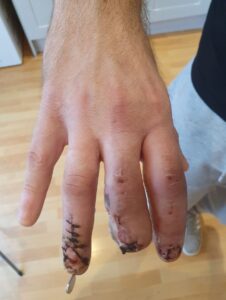
Although Mr Holloway returned to work after a six-month absence he left after just a couple of days – which resulted in him starting his career again.
An investigation by the Health and Safety Executive (HSE) found the company did not adequately guard their machinery, did not provide suitable and sufficient checks to ensure that their protective measures were working effectively, and allowed the disabling of guarding systems and access to dangerous parts of machinery.
Stateside Foods Limited of Lancaster Way, Westhoughton, Bolton, pleaded guilty to breaching Section 2 (1) and 3 (1), of the Health and Safety at Work etc Act. The company was fined £800,000 and was ordered to pay £5,340 costs at a hearing on 15 March 2024 at Bolton Crown Court. The prosecution was brought by HSE enforcement lawyers Sam Crockett and supported by senior paralegal officer Stephen Parkinson.
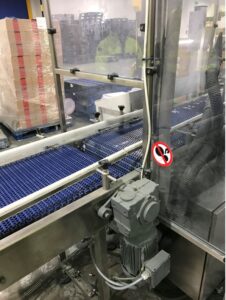
After the hearing, HSE inspector Leanne Ratcliffe said: “This is one of the country’s major food companies.
“The injuries sustained by both of these workers has been truly life changing.
“This case should send a message to industry about how important it is understand the risks of bypassing guarding arrangements, and to re-evaluate their own guarding arrangements and procedures to eliminate any access to dangerous parts of machinery.
“We will always be prepared to take action when companies fall short of their duties and responsibilities to protect their staff.”
HSE Enforcement Lawyer Kate Harney presented the case at Bolton Crown Court.
Construction firm fined after worker dies from falls
Why are people still falling from height in the workplace?
Rob@complisafe “Quite often it is down to the employer not appointing the right people with the skills, knowledge, experience and training”
A construction company in Kent has been fined after a sub-contractor fell and died from his injuries.
Mark Tolley, 51, fell nearly two metres through an opening in a scaffold on 5 July 2017 while working on the construction of six houses on Smarden Road in Headcorn, Kent.
He sustained several broken ribs and serious internal injuries including a punctured lung. He later died on 13 July 2017.
Mr Tolley had been installing vertical hanging tiles on one of the new properties when he fell 1.8 metres through an unguarded opening in the scaffold and landed on the ground below.
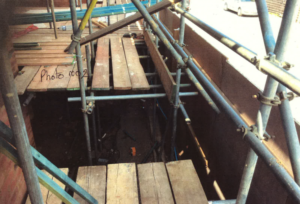
An investigation by the Health and Safety Executive (HSE) found Amberley Homes (Kent) Ltd, the principal contractor for the project, had not appointed a person with the necessary skills, knowledge, experience and training to manage the construction site. The company had not ensured that a safe working platform on the scaffold was maintained throughout the different phases of the project. Access to and from the first lift working platform was unsafe as multiple openings had been made which could subsist for several weeks. The openings were unguarded and therefore there was a significant risk of falling circa 1.8 metres from the working platform.
Amberley Homes (Kent) Ltd did not control the site effectively. Its monitoring was ineffective as it did not act on concerns raised by its safety consultant when he drew the problems with site management.
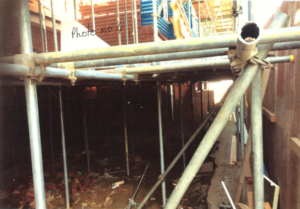
HSE guidance states principal contractors must plan, manage, monitor and coordinate health and safety in the construction phase of a project. More on this can be found at: Construction (Design and Management) Regulations 2015 (hse.gov.uk)
Amberley Homes (Kent) Ltd, of London Road, Sevenoaks, Kent, entered a guilty plea to breaching Regulation 13(1) of the Construction (Design and Management) Regulations 2015 during a trial at Maidstone Nightingale Court in January 2024. The company was fined £25,000 and ordered to pay £83,842.34 in costs at Canterbury Crown Court on 15 March 2024.
HSE principal inspector Ross Carter said: “This tragic death could have been so easily avoided by implementing suitable site management to ensure that the scaffold was appropriately adapted by competent persons for the needs of the different sub-contractors.
“This case highlights that principal contractors should be aware that HSE will not hesitate to take appropriate enforcement action against those who fall below the required standards and do not plan, manage and monitor the construction phase effectively.”
Metal recycling company fined £200,000 after employee’s arm severed
Complisafe comment:
Is it difficult to ensure moving machinery is guarded to prevent injuries?
Rob@complisafe “No, it can be done in so many practical ways ranging from fixed guards, interlocking guards or even machinery segregation.”
A scrap metal recycling company in Essex has been fined £200,000 after an employee’s arm was severed when it became entangled in a catalytic converter sampling machine.
Elena Troia was working for F.J. Church and Sons Ltd at its recycling facility in Rainham, Essex, on 12 June 2021 when she passed her hand through an unguarded rotary valve to remove a blockage.
The valve closed, trapping and severing the 34-year-old’s right arm. Ms Troia’s right arm was later amputated as a result of the incident and she has been unable to work since.
An investigation by the Health and Safety Executive (HSE) found that F.J. Church and Sons failed to prevent access to dangerous parts of machinery, namely the rotating parts of a rotary valve inside the sampling machine.
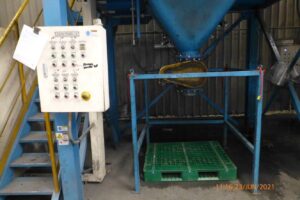
HSE guidance states employers must take effective measures to prevent access to dangerous parts of machinery. This will normally be by fixed guarding but where routine access is needed, interlocked guards (sometimes with guard locking) may be needed to stop the movement of dangerous parts before a person can reach the danger zone. Further guidance can be found here: Provision and Use of Work Equipment Regulations 1998 (PUWER) (hse.gov.uk)
F.J. Church and Sons Ltd, of Centenary Works, Manor Way, Rainham, Essex, pleaded guilty to breaching Regulation 11(1) of the Provision and Use of Work Equipment Regulations 1998. The company was fined £200,000 and ordered to pay £5,125.37 in costs at Stratford Magistrates’ Court on 5 March 2024.
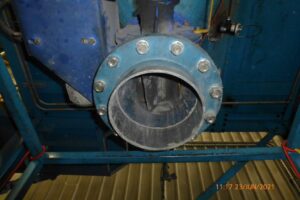
HSE inspector Marcus Pope said: “Every year, a significant proportion of accidents, many of them serious and sometimes fatal, occur as a result of poorly guarded work equipment. In this case this was a wholly avoidable incident, caused by the failure to guard dangerous parts. Had the company added suitable guarding to the outlet of the machine, this life-changing injury would not have occurred.”
This HSE prosecution was brought by HSE enforcement lawyer Jon Mack and paralegal officer Lucy Gallagher.
Company and director sentenced after employee crushed to death
A company and its director have been sentenced following the death of an employee.
Robert Czachracz was crushed by two granite slabs while working for West Midlands firm Graniteland Limited on 30 November 2020.
The 46-year-old, who was from Poland, had been unpacking and moving the slabs onto storage racks, using an overhead crane, at the company’s Lyde Green site in Halesowen.
Two of the slabs, each weighing 250kg, fell and crushed Mr Czachracz against a forklift truck while he was operating the crane’s handheld pendant control.
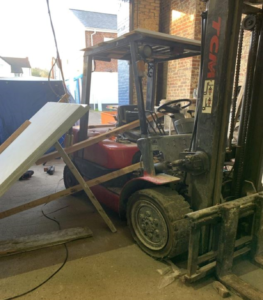
He died at the scene despite desperate attempts from bystanders at nearby businesses and the emergency services to save him.
A Health and Safety Executive (HSE) investigation found Graniteland Limited and its director, Mr Shu Lai Li, failed to implement staff training or develop safe systems of work for the unloading, loading and handling of concrete slabs. There was no evidence that employees had received training in the safe operation of machinery, including the overhead crane. The overhead crane and forklift truck had also not been thoroughly examined, as required by law, and that webbing slings, that could have been used during the unpacking process, were damaged.
HSE guidance states employers must manage and control the risks to avoid any injury or damage during lifting operations. More on this can be found at: Lifting Operations and Lifting Equipment Regulations (LOLER) (hse.gov.uk)
Graniteland Limited, of Lyde Green, Halesowen, pleaded guilty to breaching Section 2(1) of the Health and Safety at Work etc. Act 1974. The company was fined £18,000 and ordered to pay £4,196.03 in costs at Dudley Magistrates’ Court on 6 March 2024.
Mr Shu Lai Li, of Lyde Green, Halesowen, pleaded guilty to breaching Section 37(1) of the Health and Safety at Work etc. Act 1974. He was ordered to complete 120 hours of unpaid work and pay £4,043.42 in costs at Dudley Magistrates’ Court on 6 March 2024.
HSE inspector Mahesh Mahey said: “This was an entirely preventable accident. The risks of lifting and moving granite slabs were obvious, yet could have been controlled by relatively simple and inexpensive measures. The company and director failed to adequately control lifting operations which resulted in an employee needlessly and tragically losing his life.”
This prosecution was brought by HSE enforcement lawyer Andy Siddall and supported by HSE paralegal officer Rebecca Forman.
Company fined after delivery driver suffers brain injury
A company has been fined £380,000 after a delivery driver fell and suffered a traumatic brain injury while working at its site in Walsall.
Timothy Bates was delivering fuel for a temporary diesel generator at Haldane Fisher Limited’s timber processing site on Long Street when he fell from a trailer on 28 July 2022.
Mr Bates, who is from Stafford, had been stowing equipment in a trailer attached to his truck when the vehicle was struck by a forklift truck reversing out of a nearby mill. This led to the trailer shunting into Mr Bates, with the 57-year-old then falling over and hitting his head onto the tarmac floor below.
He spent five weeks in hospital after sustaining a traumatic brain injury before spending 13 weeks in a care facility where he undertook CBT. He suffers from memory loss and dizziness as a result of his brain injury.
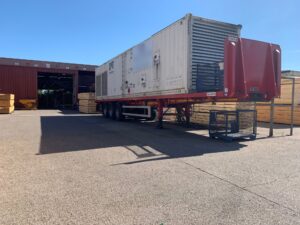
A Health and Safety Executive (HSE) investigation found Haldane Fisher Limited, trading as GE Robinson, failed to identify safe systems of work for the delivery of fuel to the temporary generators at its site. There was inadequate segregation of vehicles and pedestrians in the yard. There were no measures in place to prevent forklift trucks from entering the areas in which delivery drivers were working whilst refuelling generators.
The company understood the risks associated with workplace transport, as control measures had been identified for separating pedestrians and vehicles, but these had not been implemented. Site rules had been identified but were not routinely implemented or monitored by the company.
Every workplace must be safe for the people and vehicles using it and traffic routes must be suitable for the people and vehicles using them. HSE has guidance on workplace transport with advice on keeping traffic routes safe and separating people from vehicles.
Haldane Fisher Limited, of Shepherds Way, Carnbane Industrial Estate, Newry, Northern Ireland, pleaded guilty to breaching Sections 2(1) and 3(1) of the Health and Safety at Work etc. Act 1974. The company was fined £380,000 and ordered to pay £5,934.50 in costs at Birmingham Magistrates’ Court on 1 March 2024.
HSE inspector Heather Campbell said: “This case highlights the dangers arising from inadequate management of workplace transport. It also highlights the requirements to ensure the safety of non-employees including contractors at employer’s sites.”
This prosecution was brought by HSE enforcement lawyer Samantha Wells and supported by HSE paralegal officer Gabrielle O’Sullivan.
Want to avoid prosecution? Start by getting a full Health and Safety Audit Audit of your operations and activities to identify where the gaps may be…
Health & Safety Audits in Croydon, London, England – Complisafe
We can also carry out a physical Health and Safety Inspection of your yard, workshop or factory.
Health & Safety Construction Site Inspections in Croydon, London – Complisafe
We also pride ourselves on our competent person service or competent source of advice for all clients or all sizes who want an expert on hand.
Competent Advice and Support for Health & Safety – Croydon, London (complisafe.co.uk)
